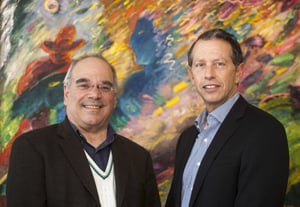
When Marc Feldman bumped into a South Korean executive at a Santa Monica luncheon three years ago, it was the first step in a process that now has him packing his bags for Israel: An opportunity in the land of milk, honey and startups compelled him to make that exodus.
Israel punches well above its weight in terms of creating businesses, especially those in the life sciences. It ranks first in the world in medical device patents per capita and second in biotech.
And South Korea, led by such brands as Samsung Group and LG Corp., has become a global leader in high-tech manufacturing. So Feldman and his team are looking to connect Israeli ideas with Korean production through a $50 million fund.
“The opportunity is in Israel’s ability to create out of a lab and South Korea’s ability to take an idea and commercialize it,” said Feldman.
Feldman, a former senior manager who ran the Israel desk at private equity firm Shamrock Capital Advisors in West Los Angeles, and his partners Jerry Katz, an attorney with Glaser Weil in Century City, and veteran Korean investor David J.W. Suh, are now raising money for their Korea-Israel Life Science Fund. The trio formed a West L.A. company called DPL Asset Management.
The Korea-Israel fund will link early stage Israeli life sciences companies with Korean manufacturers, mainly by selling the Israeli companies to them or licensing their technologies, although it is also open to taking companies public if there are opportunities to do so. It will invest between $750,000 and $1.5 million and take equity stakes of 10 percent to 30 percent in its portfolio companies. Shamrock, which manages money on behalf of the Disney family, has committed to a follow-on investment of 10 percent of the fund size.
Feldman went to the Milken Institute one day in 2011 hoping to learn more about potential health care investment opportunities. He was intrigued by the presentations of several Israeli companies.
“It was one of the most compelling, interesting mornings,” said Feldman. “Every company that was there had a novel idea.”
On a break, Feldman met former LG executive named Yoon Suh, who had been living in San Francisco while looking to make investments in life sciences startups.
“We said, ‘It would be great if we had money to invest in some of these opportunities,’” Feldman recalled.
Feldman and Yoon Suh, whose uncle was a founder of now-defunct Korean conglomerate Daewoo Group, began laying the groundwork for a fund to do just that. The pair took a two-week trip to Israel, meeting with entrepreneurs, researchers and politicians. Last year, Feldman asked his friend Katz, to join them. Katz, whose father fought in the Israeli war of independence and has deep connections to the country, said yes.
“It really struck a chord with me,” said Katz.
Around that time, LG asked Yoon Suh to return to the firm to take a position as a research executive. He had to bow out of managing the Korea-Israel fund and was replaced by his brother David Suh, a former futures trader.
“I thought it was a natural fit for us to combine the entrepreneurial spirit and the ideas of the Israeli people, and once it grew to a certain level, let the Koreans take it and run with it,” said David Suh.
Closer ties
Israel gives birth to a lot of businesses but doesn’t always see them into adulthood, Katz and Feldman said.
“The entrepreneurial spirit is unmatched in Israel,” Katz said. “But there is a real problem in developing companies and sustaining that development.” Businesses that are born there find the country’s infrastructure insufficient to scale up to mass produce for the global market.
Meanwhile, South Korea is home to megacorporations that are household names selling smartphones, semiconductors and cars around the world, but it hasn’t historically been an easy place to grow a startup.
The complementary strengths of each country’s economy jumped out to Feldman, Katz and the Suhs, forming the base of their investment strategy. They were also not lost on Israeli and Korean business and political leaders.
The two countries have recently been fostering closer ties, helped by the policies of a new Korean government led by President Park Geun-hye, who has expressed her desire to improve the creative economy.
Feldman sees more economic activity between Israel and Asian countries than any time in the history of Israel.
“They’re embracing Asia and Asia’s embracing them,” he said. “It is a very substantial set of relationships.”
Feldman has already identified several potential targets, including an animal health company and a firm that is in the contraceptives business. For competitive reasons, he wouldn’t name the companies.
Every new fund faces an uphill climb in raising money, and this one, which has a very particular flavor, is not exempt.
“We’re not vanilla or chocolate,” said Feldman. “We’re pistachio ice cream. We’re different. Not everyone likes pistachio ice cream.”
While all three partners are currently fundraising, Feldman is also getting ready to say goodbye to his Southern California home, preparing to move to Israel with his family by the end of the year. He’s in charge of sourcing deals in Israel and feels an obligation to the people giving him money to be on the ground.
“The only way to take advantage of these opportunities is to be there on a full-time basis,” he said.
